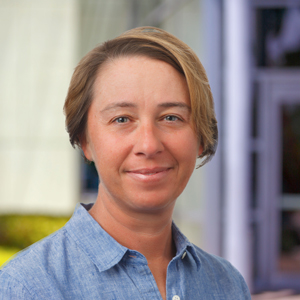
Dr. Kate Carroll received her B.A. in 1996 in biochemistry at Mills College followed by completion of her Ph.D. in biochemistry from Stanford University in 2003. From there she became a Postdoctoral Fellow under the mentorship of Dr. Carolyn Bertozzi at UC Berkeley from 2003-2006. Dr. Carroll has climbed the ranks from Assistant Professor of Chemistry at University of Michigan (2006-2010) to Associate Professor of Chemistry (2010-2013) and finally as Professor of Chemistry at UF Scripps Biomedical Research.
The Carroll lab has a proven track record of attacking fundamental problems in redox biology through a powerful, interdisciplinary approach that integrates synthetic chemistry with proteomics, biochemistry, and cell biology. One of the overarching goals of her lab is to understand the biological chemistry and molecular mechanisms of redox-based cellular regulation and signal transduction. Specifically, Dr. Carroll places an emphasis on researching the role of cysteine oxidation, a ubiquitous and conserved mechanism for controlling protein function. Other interests are focused on developing a new class of inhibitors that targets oxidized cysteine residues of key proteins involved in human disease, such as kinases and phosphatases. Additionally, her lab also investigates sulfur metabolic pathways that are essential for infection and long-term survival of human pathogens.
Some goals of the Carroll research lab include:
- Discovery of key regulator nodes of redox-signaling networks
- Identification of profile changes in protein cysteine oxidation associated with disease
- Using the information discovered, development of new diagnostic and therapeutic approaches
Overall, the Carroll lab encompasses a wide array of representative skill sets and expertise, highlighting the collaborative and interdisciplinary approach to her research. These areas include:
- Chemical tool development: Synthetic chemistry with analytical characterization
- Cell culture: Mammalian cell lines, bacteria, and primary cultures
- Proteomics: Solid-phase capture, fractionation, LC-MS/MS, bioinformatics
- Molecular imaging: Confocal microscopy, and flow cytometry
- Gene discovery: Activity-based protein profiling
- Animal studies: Mouse physiology
- Molecular biology: Cloning, transfections, RNAi, PCR, and CRISPR
- In vitro biochemistry: Protein preparation, purification, and protein engineering